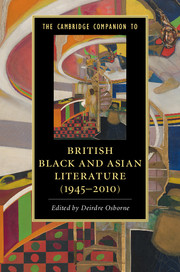Book contents
- Frontmatter
- Dedication
- Contents
- Contributors
- Acknowledgements
- Timeline
- Introduction
- PART I TRACES AND ROUTES
- 1 1940s–1970s
- 2 British Black and Asian Writing since 1980
- PART II TRANSLOCATIONS AND TRANSFORMATIONS
- PART III RESTORATIONS AND RENOVATIONS
- PART IV NATIONAL, INTERNATIONAL, TRANSGLOBAL
- Further Reading
- Index
- Series list
2 - British Black and Asian Writing since 1980
from PART I - TRACES AND ROUTES
Published online by Cambridge University Press: 05 September 2016
- Frontmatter
- Dedication
- Contents
- Contributors
- Acknowledgements
- Timeline
- Introduction
- PART I TRACES AND ROUTES
- 1 1940s–1970s
- 2 British Black and Asian Writing since 1980
- PART II TRANSLOCATIONS AND TRANSFORMATIONS
- PART III RESTORATIONS AND RENOVATIONS
- PART IV NATIONAL, INTERNATIONAL, TRANSGLOBAL
- Further Reading
- Index
- Series list
Summary
The period 1980–2010 saw an increase and diversification in writing by black and Asian writers in the UK, augmented thematically and aesthetically by work from generations born and/or educated in Britain and their new configurations of questions of difference and identity. While often marked by the effects of racism and social exclusion, the writing of this period offers imaginative insights into new diasporic communities, with perspectives on colonial history, the slave trade, the effects of the rise of global Islamism and what Stuart Hall has called ‘multicultural drift’. The context for this writing is a Britain undergoing major social and cultural changes, driven in part by increased immigration, ongoing struggles over discrimination, racialised inequalities, the nature and content of education, and debates over what it means to be British.
Although racial discrimination was made illegal in the 1970s, the process of transforming institutional and interpersonal racism has been slow, and is an ongoing theme in contemporary literary and dramatic work. Authors use a broad spectrum of literary forms, including narrative fiction, autobiography, poetry and drama, frequently experimenting with transgeneric approaches that can interweave, fragment and transform these forms. While significant numbers of works have been discussed in the media and at literary festivals, and short-listed for literary and dramatic prizes, others remain less widely known. Paul Warmington foregrounds the link between formal education (schooling) and education as cultural survival (with a broader remit of cultural longevity), where ‘Black Britain has produced many intellectual, cultural and educational spaces outside formal settings: supplementary schools, independent community education projects, reading circles, grassroots journals, bookshops and publishing houses’. The strategy of small presses publishing both unknown and established writers has been important in building audiences for new writers. In addition to black and Asian publishing initiatives, community publishers such as Centreprise and feminist publishers Sheba Press, the Women's Press and Virago created access to work which did not always receive mainstream attention. Following on from presses established in the 1960s and 1970s, further small influential publishers emerged during the 1980s. Mantra Publications (1984–) specialises in fiction about British Asian life (often bi-lingual) aimed at young audiences and has among its titles prize-winning texts by Sailesh Ramakrishnan and Ravinder Randhawa.
- Type
- Chapter
- Information
- Publisher: Cambridge University PressPrint publication year: 2016
- 3
- Cited by



